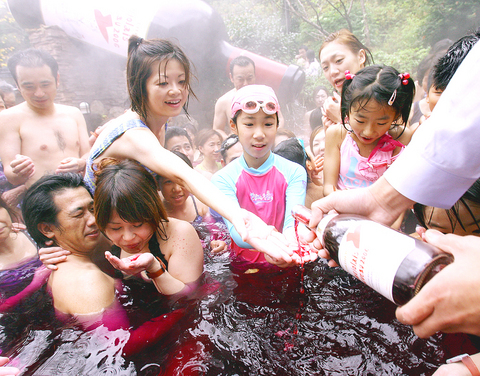The Japanese like Beaujolais Nouveau wine so much they're swimming in it ... literally.
A hot spring spa resort in Hakone, a resort region near Japan's celebrated Mount Fuji, is pouring the fruity red wine into one of its pools until Sunday to celebrate the release of this year's product.
The Hakone Kowakien Yunessun has invited a French sommelier to come to Japan to pour a dozen bottles of the Beaujolais Nouveau, produced by France's Cordier, into its open-air "wine spa" every day.

PHOTO: AFP
"We installed the wine spa last year, and conducted the Beaujolais Nouveau celebration. It was a great success," said Seiji Sanada, an official at Yunnesun.
"The aroma of Beaujolais is very pleasing, very nice. From the open-air spa, you can see the mountains, leaves turning color and hear the sound of a nearby ravine. It's very pleasant," he said.
Yesterday when officials in the "wine spa" poured the Beaujolais Nouveau into the bath, people enjoyed catching the wine falling through the air with their hands and tasting it, while soaking in the bath at the same time.
Japan is the biggest importer of Beaujolais Nouveau, with the wine sold everywhere from fine restaurants to convenience stores.
Even though beer and Japanese sake remain far more popular than wine, Beaujolais Nouveau has become a seasonal fad in Japan which this year ordered a record 11 million bottles.
Sanada insisted that the Beaujolais bath had real value.
Wine smoothens the skin and its aroma relaxes the mind, he said.
The company said bathing in wine is "a rejuvenation treatment."
"It has been said that the Queen of Egypt, Cleopatra, loved to bath in wine," said a company release.
Japan is dotted by natural springs, or onsen, where people kick back and soak in steamy hot water.
ALCOHOL COULD DAMAGE YOUR HEALTH

ENDEAVOR MANTA: The ship is programmed to automatically return to its designated home port and would self-destruct if seized by another party The Endeavor Manta, Taiwan’s first military-specification uncrewed surface vehicle (USV) tailor-made to operate in the Taiwan Strait in a bid to bolster the nation’s asymmetric combat capabilities made its first appearance at Kaohsiung’s Singda Harbor yesterday. Taking inspiration from Ukraine’s navy, which is using USVs to force Russia’s Black Sea fleet to take shelter within its own ports, CSBC Taiwan (台灣國際造船) established a research and development unit on USVs last year, CSBC chairman Huang Cheng-hung (黃正弘) said. With the exception of the satellite guidance system and the outboard motors — which were purchased from foreign companies that were not affiliated with Chinese-funded

PERMIT REVOKED: The influencer at a news conference said the National Immigration Agency was infringing on human rights and persecuting Chinese spouses Chinese influencer “Yaya in Taiwan” (亞亞在台灣) yesterday evening voluntarily left Taiwan, despite saying yesterday morning that she had “no intention” of leaving after her residence permit was revoked over her comments on Taiwan being “unified” with China by military force. The Ministry of the Interior yesterday had said that it could forcibly deport the influencer at midnight, but was considering taking a more flexible approach and beginning procedures this morning. The influencer, whose given name is Liu Zhenya (劉振亞), departed on a 8:45pm flight from Taipei International Airport (Songshan airport) to Fuzhou, China. Liu held a news conference at the airport at 7pm,

AIR SUPPORT: The Ministry of National Defense thanked the US for the delivery, adding that it was an indicator of the White House’s commitment to the Taiwan Relations Act Deputy Minister of National Defense Po Horng-huei (柏鴻輝) and Representative to the US Alexander Yui on Friday attended a delivery ceremony for the first of Taiwan’s long-awaited 66 F-16C/D Block 70 jets at a Lockheed Martin Corp factory in Greenville, South Carolina. “We are so proud to be the global home of the F-16 and to support Taiwan’s air defense capabilities,” US Representative William Timmons wrote on X, alongside a photograph of Taiwanese and US officials at the event. The F-16C/D Block 70 jets Taiwan ordered have the same capabilities as aircraft that had been upgraded to F-16Vs. The batch of Lockheed Martin

GRIDLOCK: The National Fire Agency’s Special Search and Rescue team is on standby to travel to the countries to help out with the rescue effort A powerful earthquake rocked Myanmar and neighboring Thailand yesterday, killing at least three people in Bangkok and burying dozens when a high-rise building under construction collapsed. Footage shared on social media from Myanmar’s second-largest city showed widespread destruction, raising fears that many were trapped under the rubble or killed. The magnitude 7.7 earthquake, with an epicenter near Mandalay in Myanmar, struck at midday and was followed by a strong magnitude 6.4 aftershock. The extent of death, injury and destruction — especially in Myanmar, which is embroiled in a civil war and where information is tightly controlled at the best of times —